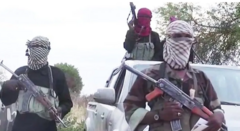How Did Boko Haram's Overnight Attack Claim 60 Lives in a Nigerian Village?

Published: 2025-09-06 21:18:04 | Category: world
The recent attack by Boko Haram in Nigeria's north-eastern Borno State has resulted in the tragic deaths of over 60 individuals, underscoring the ongoing violence and instability caused by this militant group. This incident highlights the persistent threat posed by Boko Haram and its affiliates, as well as the challenges faced by the Nigerian military in combating the insurgency.
Last updated: 13 October 2023 (BST)
Key Takeaways
- Boko Haram's recent attack in Darul Jamal resulted in over 60 fatalities, including five soldiers.
- The Nigerian Air Force retaliated, reportedly killing 30 militants in subsequent airstrikes.
- This incident reflects a broader resurgence of jihadist activity in Nigeria's north-east.
- Borno State has been the epicentre of a protracted insurgency, displacing over two million people.
- Local officials are calling for enhanced military support to address security challenges.
Overview of the Attack in Darul Jamal
On a fateful Friday night, Boko Haram militants targeted the village of Darul Jamal, a site recently resettled after years of displacement. This attack, which resulted in over 60 fatalities, has raised alarms about the state of security in Nigeria's north-eastern region. Among the deceased were at least five soldiers, underscoring the direct threat posed to military personnel in the area.
The Immediate Aftermath
Following the assault, the Nigerian Air Force launched a series of airstrikes aimed at neutralising the militants responsible for the attack. According to military spokesperson Ehimen Ejodame, these operations were successful, resulting in the deaths of approximately 30 insurgents. The airstrikes were described as "precise and successive," aimed at militants fleeing towards nearby bushes.
The Broader Context of Insurgency in Nigeria
Boko Haram has been a significant force of instability in Nigeria for over 15 years, particularly in Borno State. The group has been responsible for the deaths of more than 40,000 people and has displaced over two million individuals, severely affecting the regional population and humanitarian conditions.
A Resurgence in Violence
Recent months have seen a worrying resurgence in jihadist activity in north-eastern Nigeria, with attacks not only from Boko Haram but also from the Islamic State West Africa Province (ISWAP). These groups have intensified their operations, leading to increased civilian casualties and further destabilisation of the region.
Response from Local Authorities
In the wake of the attack, Borno Governor Babagana Zulum expressed deep sadness over the incident, particularly given that the village had only recently begun to recover from years of violence. He highlighted the inadequacy of the Nigerian army's current strength to effectively combat the escalating insurgency, indicating a pressing need for additional military resources.
Formation of the Forest Guards
In response to the deteriorating security situation, a newly established force known as the Forest Guards is set to support existing military personnel in the region. This initiative aims to bolster local security efforts, particularly in areas that have been disproportionately affected by insurgent activity.
The Historical Context of Boko Haram's Insurgency
Boko Haram's notoriety skyrocketed in April 2014 when the group kidnapped over 270 schoolgirls from the town of Chibok. This act drew international condemnation and brought global attention to the ongoing conflict in Nigeria. At its peak in 2015, Boko Haram controlled significant territories in Borno State, but military efforts have since reduced its operational capacity.
Impact of Neighbouring Nations' Military Withdrawals
The situation has become more complex following the withdrawal of troops from Niger, which had been part of a regional coalition to combat the threat posed by Boko Haram. This reduction in cross-border military support has created additional challenges for Nigerian forces, further complicating the fight against insurgency.
Humanitarian Impact of the Insurgency
The ongoing violence has had a devastating humanitarian impact on the local population. Displacement, food insecurity, and lack of access to basic services have become commonplace in the wake of the insurgency. Many communities, such as Darul Jamal, are struggling to rebuild after years of conflict, only to be met with renewed violence.
International Response and Aid Efforts
International organisations and humanitarian agencies have been working to provide support to the affected populations. However, the escalating violence complicates these efforts, making it difficult to deliver aid and assistance where it is most needed.
Conclusion: The Path Forward
The recent attack in Darul Jamal serves as a stark reminder of the challenges that remain in Nigeria's north-eastern region. As Boko Haram and its affiliates continue to pose a significant threat to security, it is crucial for both local and international stakeholders to re-evaluate their strategies and responses to this enduring conflict. Enhanced military support, along with continued humanitarian efforts, will be essential in addressing the ongoing crisis and helping communities rebuild.
As Nigeria grapples with these challenges, the question remains: what measures can be effectively implemented to ensure the safety and security of vulnerable populations in the face of persistent insurgency? #BokoHaram #Nigeria #SecurityCrisis
FAQs
What is Boko Haram?
Boko Haram is a jihadist militant group based in north-eastern Nigeria, known for its violent insurgency and attacks against civilians and military targets since 2009.
What triggered the recent attack in Darul Jamal?
The attack appears to be part of a resurgence in jihadist activity in north-eastern Nigeria, with Boko Haram and ISWAP increasing their operations in recent months.
How has the Nigerian military responded to Boko Haram attacks?
The Nigerian military has intensified its operations, including airstrikes aimed at neutralising insurgents following attacks, as seen in the recent incident in Darul Jamal.
What are the humanitarian implications of the insurgency?
The ongoing violence has led to widespread displacement, food insecurity, and a lack of access to essential services for millions of people in north-eastern Nigeria.
Are there any international efforts to address the crisis?
Yes, various international organisations are providing humanitarian aid to affected populations, although ongoing violence complicates these efforts significantly.



